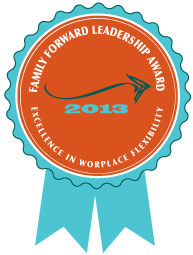
Cascade Employers Association is a membership-based association that provides resources and consulting on human resources issues. Based in Salem, Cascade Employers Association has 16 employees and over 400 members. They have an additional office in Portland and employees that live and work in other cities as well.
I started at Cascade 37 years ago when I was right out of high school. I worked here while I raised my children. Later, I worked here while I was the primary caregiver for my father. I have always known I could take the time I needed for my family. — Gayle Klampe, President

What family-friendly work/life policies does cascade employers association provide?
Flexible scheduling is common at Cascade Employers Association. And how it works is different for each person. Schedules are tailored to people’s individual needs and can change over time as people’s life circumstances change. For some, it’s about occasionally coming into the office late or leaving early or being able to work at home if a child is home sick from school. For others, it’s about working remotely most of the time and only coming into the office for meetings one day a week. Folks at Cascade Employers Association stress that there is no magic formula – it has to be figured out on a case-by-case basis.
Cascade Employers Association offers generous paid time off, which employees find they are more able to use for vacations because flexibility allows them to deal with things like doctor’s appointments or staying home with sick children without having to use accrued vacation time off. Children are welcome at the office and are often there when there are school closures – again, allowing parents to care for their kids without losing work or vacation hours. After they’ve accumulated 160 hours of PTO, it goes into a catastrophic leave bank that they can use for longer-term leaves due to illness or to care for a family member. They also have short-term and long-term disability, which can help employees access some pay during longer-term leaves. They also allow people to take additional unpaid time off if they need it to take care of a new child, an aging relative, deal with an illness, or other family leave situation.
Part-time schedules are allowed, and part-time workers earn comparable pay and benefits, as well as access to managerial positions. (By comparison, nationally part-timers earn 20% less per hour than their full-time counterparts.) Over time, some employees move back and forth between part-time and full-time as their family responsibilities change.
Phased-in retirement has become the typical retirement process at Cascade Employers Association. It means that older employees reduce their work hours over a period of time, rather than stopping work all at once -This has turned out to be helpful to employees who are ready to reduce hours but still need some income and still have the desire to be working. They’ve found that it also helps the organization, because they don’t lose that person’s expertise and organizational knowledge all at once.
Most of Cascade Employers Association employees are salaried. They have two hourly administrative support employees They work together so they can have flexibility. They also know their schedule at least four weeks in advance, which is critical for people who need to arrange for child care or elder care.
How do These Policies Benefit Cascade Employers Association?
Flexibility benefits their organization by building productivity, engagement, and loyalty. Remote access allows people to work from home on days when they need to stay home with a sick child, or are sick themselves and can’t make it to the office but do feel up to working. It also helps efficiency when people have off-site meetings and they can work in between without having to drive to the office. Employees appreciate the flexibility and in turn are able to give more energy and focus when they are working.
Why Flexibility @ Cascade Employers Association?

Flexibility evolved partly organically and partly as a result of some intentional decisions. As better technology was becoming available, they hit a critical step of deciding whether or not to invest money in the infrastructure to give everyone remote access. They decided to do it, giving all employees a laptop and reimbursement for cell phones so that they could work from anywhere. Once they had invested in this infrastructure, it got easier and easier to allow people to create alternate schedules. They shifted more and more toward a management style in which the key is that the work gets done — when people do the work is less important.
How are the Flexible Policies Implemented?
People at Cascade Employers Association say that making flexibility work requires a culture of trust and respect. It also requires a great deal of communication. Even when they aren’t working in the office, others know their schedule and can contact them. People see each other as equals and know that anyone can talk to anyone.
Supervisors are empowered to handle issues of flexibility, and Cascade makes sure that the “family first” expectation is engrained in all of the supervisors. They stress that employees’ need for time off should be a priority. They encourage working from home when that saves time, encourage people to take comp time off within the week when they’ve worked extra hours, and make sure their supervisors are in tune with this approach. They trust people to do their work. They also expect that if someone is overworking, s/he will call on team members for support.
In An Employee’s Words…
Flexibility gives me more time with my family, and in turn I have more to give to my work. I have had such tremendous benefit from it. It keeps me loyal and I work harder because I know how special a situation this is.
Jenna Reed, Cascade Employers Association employee of 8 ½ years
Click the Download button for a PDF of our Spotlight on Cascade Employers Association, winner of the 2013 Family Forward Leadership Award.
Content provided by Family Forward Education Fund.



